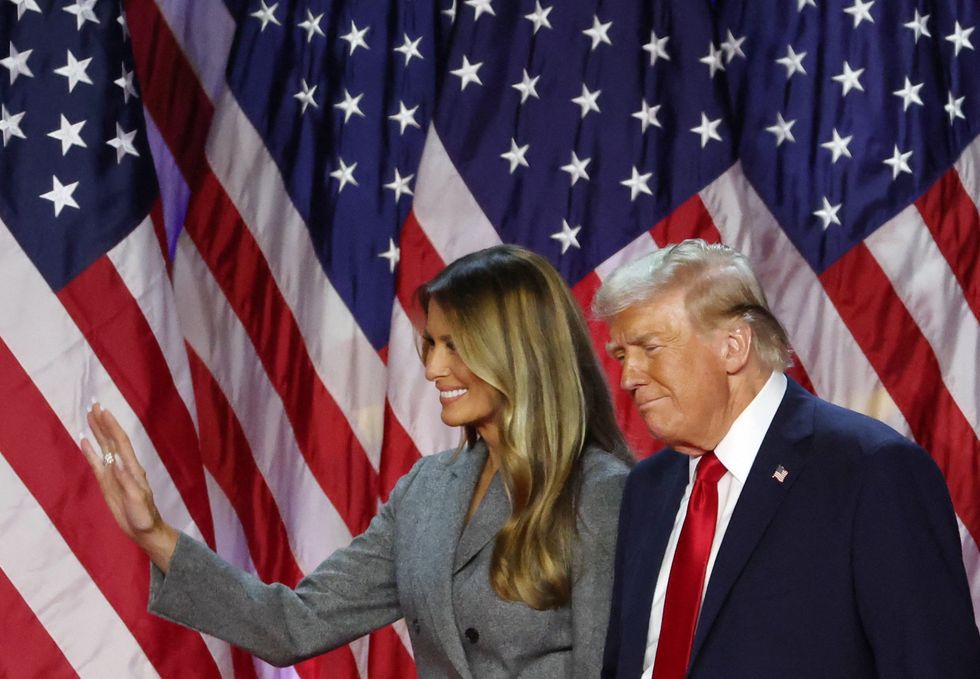As Donald Trump swore his oath of office on Monday, his supporters cheered throughout the American capital.
Not everyone is happy with the new president, however. During an immigration raid an illegal Haitian migrant with 18 previous convictions reportedly told police, “F*** Trump, Biden forever!”.
With the dawn of Trump comes his long-awaited policy of mass deportations of immigrants.
In his inauguration address, Trump promised to deport “millions and millions” of illegal aliens.
Within hours of his swearing in, he began to deliver on his core promises by signing dozens of executive orders on issues ranging from immigration to energy.
He banned DEI (diversity, equity and inclusion) programmes across government, ended affirmative action (racial discrimination in favour of ethnic minorities), and declared a national energy on the US southern border.
 Donald Trump and Melania will return to the White House following his victoryReuters
Donald Trump and Melania will return to the White House following his victoryReutersOne of the more controversial orders ended birthright citizenship for illegal migrants and those on temporary visas, meaning the children of illegal migrants are no longer given automatic citizenship. This order is set to be challenged in court as some argue that birthright citizenship is enshrined in the constitution.
Trump’s famed mass deportations programme also began within hours of his taking office, with immigration raids being launched in Chicago and Boston.
Under Joe Biden’s four years in the White House, more than eight million illegal migrants entered the United States according to estimates, though some experts suggest the number could be much higher.
Immigration, like in 2016, was one of the major reasons Donald Trump won the White House.
 A migrant screams as he is taken away by immigration enforcement agents
A migrant screams as he is taken away by immigration enforcement agents  Migrants gather at the southern borderREUTERS
Migrants gather at the southern borderREUTERSOn Monday the freezing conditions and tight security in Washington DC did not deter the new president’s most hardcore fans who turned the usually liberal city into a MAGA heartland.
Trump’s supporters could hardly contain their excitement as their president returned to the Oval Office for the second time.
For more than half of the country, Trump’s inauguration represented a return to American exceptionalism: to expansionism, masculine energy, strong borders and self-confidence.
After witnessing murders being committed by illegal migrants, including, infamously, against the young Laken Riley, millions of Americans have now been filled with hope that they will be deported. Dreams of deportations are not simply a bigoted reaction to ethnic minorities, they are a shared desire to keep Americans safe.
Britain, where there are an estimated 1.2 million illegal migrants, could learn from Donald Trump. One in twelve people in London are reportedly in the country illegally, and the country is unified in believing that levels of immigration are too high.
In both America and Britain, the public are furious that illegal migration has been allowed to occur in record numbers. Such anger may have led to the fall of both Biden and Sunak’s regimes, though Keir Starmer does not see immigration in the same way as Donald Trump.
Under Trump’s leadership, the United States could be set to enter a period of radical transformation. Alongside his immigration crackdown, the president has announced plans for sweeping economic reforms aimed at reinvigorating American industry and reducing reliance on foreign manufacturing.
His administration has already signaled its intent to withdraw from trade agreements deemed “unfair” to American workers, with whispers of a renewed focus on domestic production under the slogan “Made in America.” This economic nationalism, while energising his voter base, has sparked concerns among business leaders who fear retaliatory tariffs and disrupted supply chains.
Trump’s energy policies are also shaping up to be as contentious as his immigration measures. On his first day back in office, the president ordered the immediate expansion of domestic oil and gas drilling, promising to make the United States “energy independent within months.”
Social policies, too, are poised for dramatic change. Trump’s ban on DEI programmes has sent shockwaves through corporate America, with companies scrambling to understand the implications. Critics have accused Trump of stoking cultural divides, while his administration claims such measures are necessary to restore meritocracy. Universities, long seen as bastions of progressive ideology, are likely to face increased scrutiny under new federal guidelines discouraging affirmative action.
Beyond the policy announcements, the mood in Washington reflects a nation deeply divided. Protesters gathered in cities across the country during Trump’s inauguration, denouncing what they called his “authoritarian” approach. The Capitol building itself remains under heavy security, a stark reminder of the turbulent political climate that has come to define modern America.
For Trump’s supporters, however, this is the beginning of what they see as a national revival. The president’s focus on immigration, energy, and economic sovereignty reflects a return to priorities they feel were neglected under Biden. While critics accuse Trump of authoritarianism, his backers argue that he is merely delivering on promises that resonate with millions.